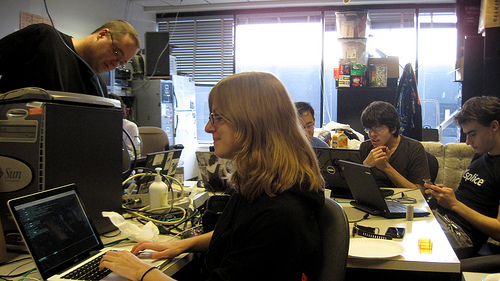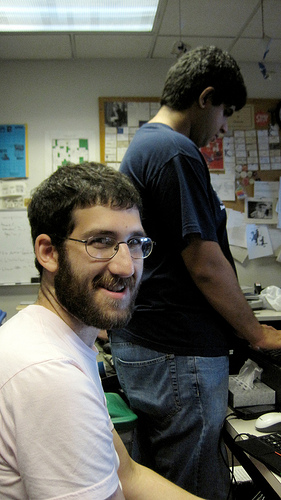Fri, 02 Sep 2011
Debian bug squashing party at SIPB, MIT

(Photo credit: Obey Arthur Liu; originally on Picasa, license.)
Three weekends ago, I participated in a Debian bug squashing party. It was more fun than I had guessed!
The event worked: we squashed bugs. Geoffrey Thomas (geofft) organized it as an event for MIT's student computing group, SIPB. In this post, I'll review the good parts and the bad. I'll conclude with beaming photos of my two mentees and talk about the bugs they fixed.
So, the good:
- Attendance. As Luke put it, when he arrived, there was hardly anyone there. “Then people showed up! And then mentorship and pedagogy happened!” In all, 14 people attended, seven of whom are active in Debian or its derivatives (Ubuntu, Debathena).
- We took photos. Arthur took a wide panoramic photo, and I snapped a few good ones, too. (Thanks to Jessica McKellar for letting me borrow her camera.) Here's my full photo set.
- Good, free pizza. Props to geofft for ordering from Beauty's, and props to SIPB for picking up the tab.
- We fixed bugs! I mentored two new Debian contributors through their first release-critical bug fix. Both of them said they would attend similar events in the future. One of my mentees is now idling and asking questions in the #debian-mentors IRC channel.
- The Debian Events team republished the event. MadameZou posted the event to debian.org, giving it a nice stable URL.
- geofft made a good list of bugs to work on. He worked from the release-critical bug list, categorized the bugs by expected difficulty, and made somee short notes about how to fix the bug. This turned out quite useful.
- People printed music to the speakers. If this sounds weird, you should read the SIPB documentation for how to use Gutenbach (written by Liz Denys).
- We had a good ratio of developers to newcomers. This was hugely helpful; from what I saw, new people rarely waited very long for their questions to be answered. Thanks to Luke Faraone, Sam Hartman, Obey Arthur Liu, Karl Ramm, and Christine Spang from Debian, and Geoffrey Thomas from Debathena, for sharing knowledge.
The event was a success, but as always, there are some things that could have gone more smoothly. Here's that list:
- We hadn't prepared for people to do Debian development on Ubuntu. In particular, it took Luke and me about half an hour to come up with a pbuilder command line that worked.
- We didn't contribute to Ubuntu, just Debian. I actually think this is fine, but geofft did originally want people to work on both. He was disappointed, and we could have managed to do that if we had done more prep.
- We could have reached more prospective attendees. I know earlier in the year, daf organized a highly popular Debian packaging tutorial elsewhere on campus. I didn't see any of those people at the event, and I think some would have attended if they had known about it.
- Some people wanted a bit more context. In particular, attendees asked me about what makes a bug release-critical and what it means to do a non-maintainer upload. We could have taken some time to explain these to the whole group; instead, we dove right into hacking. Because we had so many mentors, I think people did get their questions answered, but we can't sustain that if the event grows in size.
- Mentees didn't always get high-quality help. geofft suggested Jessica work on one bug, and when she had a question, she asked Luke Faraone. Luke wasn't familiar with the bug, and he skimmed it, not realizing that the bug changed issues midway through the bug log. As a result, his initial help was unhelpful. After Luke, Jessica, and the bug were on the same page (so to speak), Jessica received clear, sound answers to questions.
Still, it turned out well! I did three NMUs, corresponding to three patches submitted for release-critical bugs by my two mentees. Those mentees were:

Jessica McKellar is a software engineer at Ksplice Oracle and a recent graduate of MIT's EECS program. She solved three release-critical bugs. This was her first direct contribution to Debian. In particular:
- #636201: While updating the package for multiarch support, the maintainer of wildmidi presumably made a typo. A single character was missing from a "Replaces:" declaration in debian/control. This bug caused upgrades to fail. Sam Hartman uploaded an NMU based on a patch Jessica prepared.
- #626420: The scribus-doc package failed to build from source due to a missing build-depends entry. This one was super easy, and served as a good test package for setting up and using pbuilder.
- #565000: The switch to gcc-4.5 left hubbub unable to build from source due to new GCC warnings that made -Wall fail on the source, although it would succeed with earlier versions of the package. This led to long philosophical discussions about the particularly most reasonable fix: removing -Wall, or adding a more specific exception.
Jessica has since gotten involved in the Twisted project's personal package archive. Toward the end of the sprint, she explained, "I like fixing bugs. I will totally come to the next bug squashing party."

Noah Swartz is a recent graduate of Case Western Reserve University where he studied Mathematics and played Magic. He is an intern at the MIT Media Lab where he contributes to DoppelLab in Joe Paradiso's Responsive Environments group. This was definitely his first direct contribution to Debian. It was also one of the most intense command-line experiences he has had so far. Noah wasn't originally planning to come, but we were having lunch together before the hackathon, and I convinced him to join us.
Noah fixed #625177, a fails-to-build-from-source (FTBFS) bug in nslint. The problem was that "-Wl" was instead written in all lowercase in the debian/rules file, as "-wl". Noah fixed that, making sure the package properly built in pbuilder, and then spent some quality time with lintian figuring out the right way to write a debian/changelog.
That's a wrap! We'll hopefully have one again in a few months, and before that, I hope to write up a guide so that we run things even more smoothly next time.
